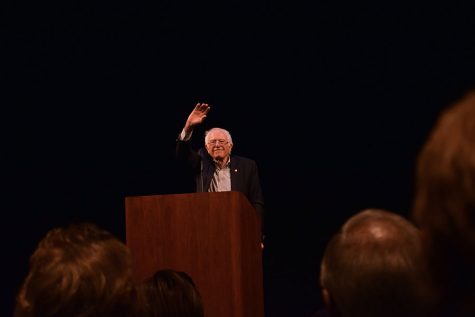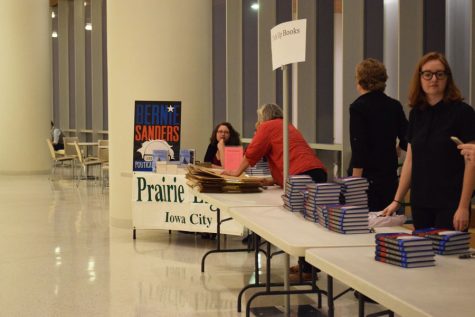Sanders promotes book and political involvement in speech at Hancher
Thirty-six hundred hands erupted into applause as Senator Bernie Sanders emerged from behind the curtain and took his place at the podium. The entire auditorium was on their feet and supporters shouted, “We love you, Bernie!” and “Feel the Bern!”
Prairie Lights brought Sanders to Iowa City on Aug. 31 to promote his new book, Bernie Sanders’ Guide to Political Revolution, meant to educate its audience on current problems in our country and inspire young people to get involved. Sanders did mention that the definition of young is extended to “anybody who is young at heart, who is prepared to stand up.”
Sanders had previously spoken at Prairie Lights for his book Our Revolution. Back then he had less of a political following, and his listeners were able to fit into the space at Prairie Lights. Looking at the sold out auditorium on the 31st, Sanders joked, “There are a few more people there tonight than there were then.”
Sanders thanked Iowans for their support and also credited them for starting the political revolution his ideas have sparked. “During the course of the campaign, I talked about the need for a political revolution, which is precisely what this book is about,” he said. “And let me be very clear that from an electoral point of view, that political revolution that is today spreading all across this country, that began right here in the great state of Iowa.”
Emerson Klever ’18 said, “Whenever I hear Bernie, I get a really strong sense of unity in the country and think about wanting to help everybody.”
“And I think we really need that right now,” Ella Schmitz ’18 adds.
Unification of people from all backgrounds is what Sanders urges people to do politically.
“What our revolution is saying and what this book is about is that at a time when a handful of billionaires have extraordinary power over the political process, as a result of this disastrous citizens united supreme court decision, the only way we can effectively fight back is when millions of people get involved in the political process in a way that we have never seen in the modern history of this country,” Sanders said.

“I would be remiss not to thank the people of Iowa and Iowa City for the tremendous support that they gave me.” said Sanders, shortly after appearing onstage.
Sanders encouraged people to run for office, educate their community and support political candidates and ideals they believe in.
“This is the first time I’ve ever felt a need to be more active.” Kerry Morrison, a Bernie Sanders supporter, said.
Morrison admitted she hasn’t taken much action to make her voice heard in politics, but hopes to change that in the future because of her disgust with the current administration.
“I think that this current political environment has shown an ugly side to our country that a lot of us did not know was as active as it is,” Morrison said.
Katherine Yacopucci ’20 is an outspoken liberal and by expressing those views, she faced some backlash. “My American studies class didn’t like me a whole lot last year because I was really, really vocal about my opinions in certain things.”
“I feel that if people just like kept themselves from [opposing] each other and they listen to other people’s views and they didn’t immediately shut people down, then it would be a lot easier for people to get along with other people who have different views,” Yacopucci said.
“I think we need to focus less on the fighting, winning and losing, and more on the discussion,” said Schmitz.
Sanders said he doesn’t believe Donald Trump won the election as much as the Democrats lost. Sanders believes they lost because they failed to understand and acknowledge the pain of Trump voters. People voted for Trump because he told them he understood their pain and could solve their problems.
“It was a strong and effective speech,” said Sanders. “Only the problem was he lied and he lied and he lied. But the fact that he lied does not mean the his analysis was incorrect.”
Sanders agreed it’s easy to make jokes about Donald Trump, but that won’t help Democrats make progress. “We have got to respect people who have different points of view and we have got to talk to those people.”

Bernie Sanders’ book, A Guide to a Political Revolution, galvanized Sanders’ Iowa City supporters. Prairie Lights, who housed his previous book event at their store, organized Sanders’ speech at the Hancher Auditorium due to an increased demand.
However, some Democrats find it difficult to communicate with Republicans civilly. “It’s sometimes hard to be heard over the cheering coming from the sides for ridiculous things. You know what they’re cheering about?” From the patio on the second floor, Steve Larson looked past the parking lot of Hancher toward North Riverside Drive, where college kids were hollering in a contrast to the quiet conversation on the patio. “They’re cheering about chugging beer.”
Larson laughed and sighed. “Anyway, I think things are kind of screwed up, and I think Bernie could help get them straightened, but he’s gonna need a lot of help.”
In his speech, Sanders went into detail on issues he discusses in his book such as affordable education, health care for all, minimum wage, the expanding wage gap, tax reform and the justice system.
Sanders said it’s more important to ask the right questions than to propose the right answers, and that night, Sanders proposed many questions to challenge our current system.
“His talk definitely made me feel better and more optimistic, because recently with all the events in the country. It … was nice that Bernie reminded us that it’s not the end and we can still do stuff about it,” said Megan Schneider ’18.
As Sanders finished his speech, he addressed people who may be feeling overwhelmed by all the problems facing our country. “What we have to understand is that what we are fighting for is much more than our own lives. We are fighting for our children and our grandchildren. We are fighting for the future of this planet. And I do not believe that we have the moral responsibility of simply throwing up our hands in despair.”
Your donation will support the student journalists of West High School. Your contribution will allow us to purchase Scholarship Yearbooks, newsroom equipment and cover our annual website hosting costs.

Natalie Dunlap is a senior and the Online Editor-in-Chief for the West Side Story. She is also involved in theatre and West High Democrats. When she's...

Pareen Mhatre is a senior and she is the Photo Editor and Online Managing Editor. This is her second year on staff. In her free time,...



